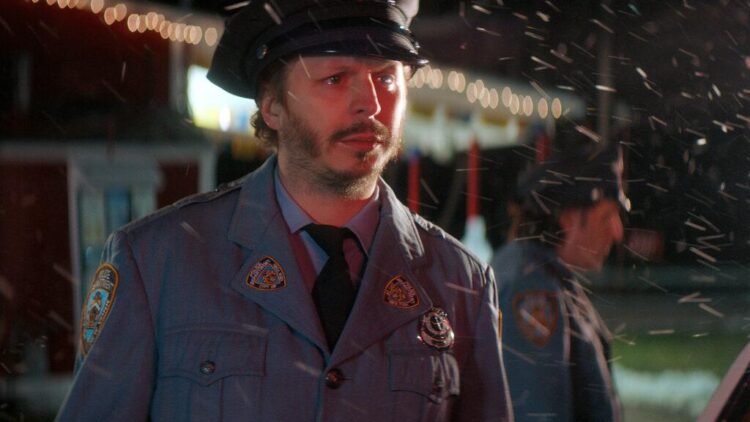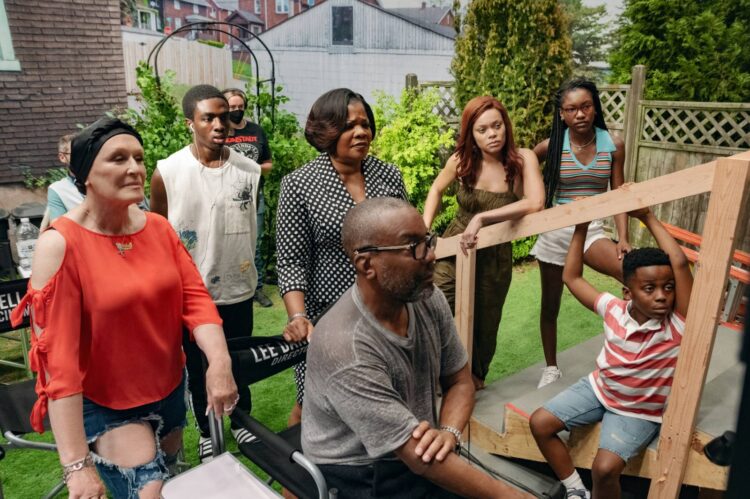

With her second feature film, Zambian-Welsh director Rungano Nyoni looks at the pain, memory, and absurdity of familial Zambian tradition. On Becoming a Guinea Fowl follows Shula (Susan Chardy), who finds her uncle dead in the middle of the road one night. Shula and her cousin Nsansa (Elizabeth Chisela) spend the first minutes of Nyoni’s film in a car, waiting for the night to end and police to arrive. Her uncle is wearing a sumo suit and has been found near the town’s brothel, making him to be a neighborhood clown acting without restraint or limitation.
Shula’s soon being visited by several aunts who plead she come to the house to mourn her uncle’s death, admonishing her for a lack of emotion. Each aunt seems to have had a serious connection to their now-dead brother, who we learn has sexually abused many of the young women in the family. Nyoni refuses to show his photo in focus, the director herself seemingly as frustrated as the protagonist. He’s a rapist, a pedophile, and an objectively “bad” person. So why is he being simultaneously mourned and celebrated as though he were a saint?
Nyoni’s film becomes a mixture of rage and tackling of Zambian burial rites, a clear-eyed look at the impossibility of these situations for the abused, the affected, the broken. But Shula often doesn’t seem broken. She’s strong, stoic, and often much quieter than those around her. She cares for Nsansa and a young cousin who’s clearly been a victim of her uncle’s horrific actions. Chardy embodies this character with a near-silent anger, a simmering frustration with the systems that push her uncle to the forefront of the community and blame everyone else. Among them are an overwhelmed teenage wife who is constantly compromising, nodding her head to help those who won’t admit her uncle’s wrongdoings, forced to watch while someone who assaulted her be recognized for a local hero. Chardy gives one of the performances of the year in one of the films in a year; I just hope audiences seek it out.
Nyoni combines this drama with a measure of surreal comedy, leaning into the fanfare of the proceedings. This comedy possibly stems from disbelief, from the shock of how a family can collectively celebrate a heinous man. But it becomes easier to understand as the film goes forward, in Nyoni’s criticism of how society holds up the figure of a father, of a man who deserves recognition simply for existing. There are no shortages for real-life examples of humans mourning the deaths of wicked, powerful men. With each successive funeral and celebration of these people, Zambia (and much of the rest of the world) continues holding men in a position of extreme, undeserved, absurd privilege and power.
On Becoming a Guinea Fowl enrages the viewer, settling into a level of prolonged stasis. Small forms of confrontation and resistance become the only option for Shula and her cousins. Nyoni has made a film that burrows inside, well-crafted and well-acted with a stellar, speedy screenplay. The writer-director never rushes this story, but still wastes no time in the film––each scene contains weight and value. Each moment builds on the memories of Shula and of the women in this family, fractured together, constantly reminded of monstrosities, somehow still taking steps forward.
If that weren’t sufficient, Nyoni knows how to end her film: steeped in tradition yet ready for change.
On Becoming a Guinea Fowl played at the 62nd New York Film Festival and opens December 13 from A24.
The post NYFF Review: On Becoming a Guinea Fowl is a Powerfully Enraging, Surreally Comedic Look at Zambian Tradition first appeared on The Film Stage.



